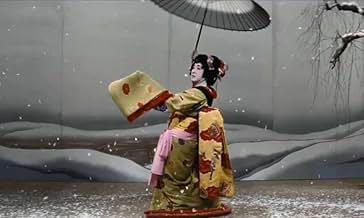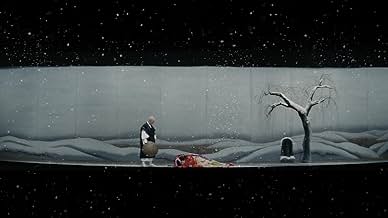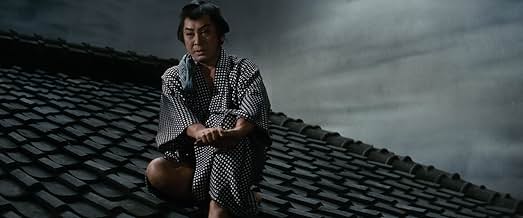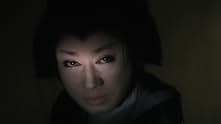AVALIAÇÃO DA IMDb
7,3/10
3,1 mil
SUA AVALIAÇÃO
Adicionar um enredo no seu idiomaYukinojo, a Kabuki actor, seeks revenge by destroying the three men who caused the deaths of his parents. Also involved are the daughter of one of Yukinojo's targets, two master thieves, and... Ler tudoYukinojo, a Kabuki actor, seeks revenge by destroying the three men who caused the deaths of his parents. Also involved are the daughter of one of Yukinojo's targets, two master thieves, and a swordsman who himself is out to kill Yukinojo.Yukinojo, a Kabuki actor, seeks revenge by destroying the three men who caused the deaths of his parents. Also involved are the daughter of one of Yukinojo's targets, two master thieves, and a swordsman who himself is out to kill Yukinojo.
- Direção
- Roteiristas
- Artistas
- Prêmios
- 1 vitória no total
Avaliações em destaque
This film begins with a Kabuki actor from Osaka by the name of "Yukinojo" (Kazuo Hasegawa) performing in the Japanese city of Edo to much applause. So much so that the Shogun's favorite concubine "Lady Namiji" (Ayako Wakao) has become quite smitten with him. Realizing this, Yukinojo decides to use this to his advantage in order to gain his revenge on three men living in Edo whose actions impoverished his family and cause both his father and mother to commit suicide. Things become more difficult, however, when a local thief named "Ohatsu" (Fujiko Yamamoto) discovers his plans and tries to use it to her advantage. Likewise, there are other characters with their own agendas who also interfere with Yukinojo's plans as well. Now, rather than reveal any more, I will just say that this film was both poetic and bizarre at the same time with good performances by all three of the aforementioned actors. Admittedly, this film may not be to everyone's liking but, even so, I recommend it to those who might be curious and I have rated it accordingly. Above average.
This movie is that rare species - a film that doesn't take itself seriously for a moment, and yet is stunningly well made and original.
According to Donald Richies '100 Years of Japanese Cinema' the director was forced to make this movie (the remake of a popular but very hammy 1930's original) as a punishment for his self indulgence in earlier movies. He responded by turning up the campiness to '11' in Spinal Tap terms.
Kon Ichikawa manages to take the story of a famous Kabuki female impersonator who wrecks revenge on three powerful men who killed his parents both beautiful (the scenery and photography is stunning) and queasy - everyone seems to fall in love with the rather ugly and very feminine leading 'man'. The story is irrelevant (presumably deliberately so), its all an exercise in style. You can see where Suzuki and many other later directors got a lot of their ideas. Kon is a very talented and skillful film maker so despite the fact that the cast are clearly playing it up for laughs, it is extremely well made, with wonderful sets and tight editing. Despite its origins, it is genuinely entertaining and required viewing for anyone with an interest in Kabuki or Japanese design.
According to Donald Richies '100 Years of Japanese Cinema' the director was forced to make this movie (the remake of a popular but very hammy 1930's original) as a punishment for his self indulgence in earlier movies. He responded by turning up the campiness to '11' in Spinal Tap terms.
Kon Ichikawa manages to take the story of a famous Kabuki female impersonator who wrecks revenge on three powerful men who killed his parents both beautiful (the scenery and photography is stunning) and queasy - everyone seems to fall in love with the rather ugly and very feminine leading 'man'. The story is irrelevant (presumably deliberately so), its all an exercise in style. You can see where Suzuki and many other later directors got a lot of their ideas. Kon is a very talented and skillful film maker so despite the fact that the cast are clearly playing it up for laughs, it is extremely well made, with wonderful sets and tight editing. Despite its origins, it is genuinely entertaining and required viewing for anyone with an interest in Kabuki or Japanese design.
There are some truly beautiful scenes here, particularly the marvellous use of widescreen in the colourful kabuki sequences and Kazuoha Segawa is faultless in the duel central role. He plays dressed as a woman on the stage but seems also to live out his life this way and he also plays his thieving side-kick. Apparently played for laughs throughout it is difficult for a non Japanese to fully appreciate much of the subtlety and Shakespearean style play on words. Indeed, for me, the whole is rather too mannered and stagey. There is much blurring between stage and 'real life' which some find charming but I tend to find rather confusing and lifeless.
This is an Ichikawa film so expect anything short of sheer visual awesomeness and yer a fool. Impeccably staged, superbly lighted and shot with remarkable flair for atmosphere, this one deserves a watch on its technical cinematic merits alone. The plot relates the adventures of a Kabuki stage actor plotting revenge against those who disgraced and drove his parents to madness and suicide, apparently a readaptation of a 30's movie. Everything is very campy though and the protagonist, a feminine man with a pathetic croaky voice dressed in woman's clothes, is bound to induce a fair amount of groans. Obviously related to the material at hand, Ichikawa stages and shoots the movie in a stylized theatrical manner. The intentional artificiality of sets and lighting perfectly mirrors that. Perhaps the best thing about it is the use of colour, with bright reds, yellows and whites offering a vibrant counterbalance to the almost complete darkness of other set-pieces. All in all, I didn't find the dramaturgy of the film very involving and I suspect Ichikawa didn't care for it either. From a technical standpoint however it is certainly commendable.
As the curtains move aside, those wanting straight-up blood and carnage, will find that "AN ACTOR'S REVENGE" goes down a different path, in what is more a patient theatrical drama of cunning revenge. And a visually striking one too. I was impressed by the audacious wide scope photography and tonal lighting of its stylistic aesthetics, which helped set up the mood and story.
Kazuo Hasegawa superbly plays a kabuki lead actor Yukinojo Nakamura, specializing as an onnagata (otherwise a female impersonator). His travelling troupe happens to be performing in the village of the three men who drove his parents to suicide when he was a child. How he goes about his revenge is like an actor playing out a part, yet he obviously takes no pleasure out of it with conflicting thoughts and hesitations. Keeping to his strengths though, he manipulates everything to his advantage using his talents and sensuality to a spin a web, and in doing so, causing unwanted grief without physical harm. He doesn't want them to die a swift death, but he wants to ruin them in the attempt to drive them mad, like they did to his parents.
The material interestingly looks at how sometimes in this quest innocence can be a casualty, and even completing this vengeance, the emotions can't fulfill that loneliness that will always linger. Sometimes that emptiness is replaced by haunting thoughts of those you destroyed to see it through. As this revenge is set in motion, there are certain unplanned obstacles, leading him to show his skill with the blade. To be honest, the few moonlight standoff scenes are quick and nothing spectacular, but it's the imagery and framing of those moments that do stand out. Director Kon Ichikawa does so much with so little. Etched with dazzling details, compact sets, thick on slow exposition and meditative characters (even jarring comic relief) in what is a classy, if distant stage play brought to life.
Kazuo Hasegawa superbly plays a kabuki lead actor Yukinojo Nakamura, specializing as an onnagata (otherwise a female impersonator). His travelling troupe happens to be performing in the village of the three men who drove his parents to suicide when he was a child. How he goes about his revenge is like an actor playing out a part, yet he obviously takes no pleasure out of it with conflicting thoughts and hesitations. Keeping to his strengths though, he manipulates everything to his advantage using his talents and sensuality to a spin a web, and in doing so, causing unwanted grief without physical harm. He doesn't want them to die a swift death, but he wants to ruin them in the attempt to drive them mad, like they did to his parents.
The material interestingly looks at how sometimes in this quest innocence can be a casualty, and even completing this vengeance, the emotions can't fulfill that loneliness that will always linger. Sometimes that emptiness is replaced by haunting thoughts of those you destroyed to see it through. As this revenge is set in motion, there are certain unplanned obstacles, leading him to show his skill with the blade. To be honest, the few moonlight standoff scenes are quick and nothing spectacular, but it's the imagery and framing of those moments that do stand out. Director Kon Ichikawa does so much with so little. Etched with dazzling details, compact sets, thick on slow exposition and meditative characters (even jarring comic relief) in what is a classy, if distant stage play brought to life.
Você sabia?
- CuriosidadesOriginally designed as a tribute to actor Kazuo Hasegawa, whose 300th film this was. The film was based Teinosuke Kinugasa's Yukinojô henge: Daiippen (1935) which also starred Hasegawa in the same dual role.
- ConexõesVersion of Yukinojô henge: Daiippen (1935)
Principais escolhas
Faça login para avaliar e ver a lista de recomendações personalizadas
- How long is An Actor's Revenge?Fornecido pela Alexa
Detalhes
- Tempo de duração1 hora 55 minutos
- Mixagem de som
- Proporção
- 2.35 : 1
Contribua para esta página
Sugerir uma alteração ou adicionar conteúdo ausente

Principal brecha
By what name was A Vingança do Ator (1963) officially released in India in English?
Responda





























